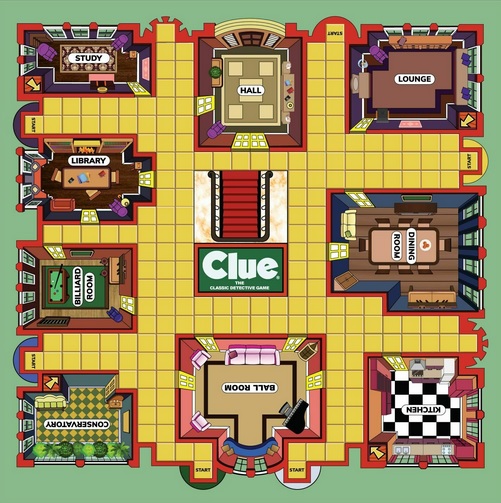
Thanksgiving has passed, Christmas, Channukah, Kwanzaa and a whole assortment of other Winter Holidays are either already upon us or just around the corner, and the big question looms: What gifts to get your friends and loved ones? Digital Dying has some ideas, albeit unconventional ones.
While video games and virtual reality headsets might be the buzz among today’s youth, long days alone with the family always brings back a certain excitement for the more traditional and old-school type of games—that is, board games! You know, they come in a colorfully designed box, with instructions printed on little pamphlets of paper, often contain fun game pieces, and can be played on the kitchen or living room table.
“As temperatures around many parts of the country dip and winter looms, people have found an old standby to endure the uncertainty of the coronavirus while they remain holed up in the colder weather,” reads an article published last holiday season with Today.com. “They’re playing board games.”
The article features the board game company Hasbro, whose best-selling games are classics such as Monopoly, Jenga, Trouble, Connect 4, Sorry, The Game of Life, and Operation. Apparently, these board games are all still selling pretty well. “Playing something that you played maybe decades ago with your family and maybe now you have a new family or your family has expanded and you’re able to play something that you played with your parents with your kids and I think that’s something that resonates,” notes Ray Adler, global head of games at another large game company, Mattel.
That is all good and fine, but here at Digital Dying, we were curious whether there was also a rich diversity of board games for the more mortality-minded player among us. Whether these games are dead serious, downright spooky, or just there to provide some laughs, there are actually some interesting options.
One game in the crime-solving genre is Murder Mystery. In this game, players work to solve a murder using the case file and evidence provided. “It’s been 30 years since famed winemaker Cary Underwood disappeared,” reads the description. “Due to a recent earthquake, his body has been discovered, along with more clues to crack this case. Work alone or with others to identify the killer’s motive, means, and opportunity to commit the murder.” The game’s accouterments involve crime scene photos, newspaper clippings, and “32 pieces of case evidence.” The game is for ages 14 and up.
Of course, one cannot forget about Clue, the timeless murder mystery board game. The game even has its own lengthy Wikipedia entry. “Each player assumes the role of one of the six suspects and attempts to deduce the correct answer by strategically moving around a game board representing the rooms of a mansion and collecting clues about the circumstances of the murder from the other players,” it states. “The object of the game is to determine who murdered the game’s victim, where the crime took place, and which weapon was used.”
What American players may not know is that the game was invented in the United Kingdom during the height of World War II, in 1943. Anthony E. Pratt, an English musician and factory worker was holed up in his home in Birmingham, England during air raids on the city and recalled the murder mystery games played by some of his clients at private music gigs. Also on his mind was popular detective fiction like Agatha Christie. In 1944, Pratt applied for a patent under a game originally titled Murder! Wikipedia notes that “Shortly thereafter, Pratt and his wife, Elva Pratt, who had helped design the game, presented it to Waddingtons’ executive Norman Watson, who immediately purchased it and provided its trademark name of Cluedo.” The name Cluedo was a play on “clue” and Ludo, ludo being Latin for “I play”.
The version of the game presently being sold on Walmart.com features a new character, Dr. Orchid. But the motions of the game are still the same. And the classic pieces are the same too. The infamous miniature weapons are made of unfinished pewter, except the rope, which may be plastic or string. There is also the candlestick, the wrench, the knife or dagger (depending on which country you are playing the game, in the US and Canada it is a knife), the lead pipe, which in the earliest versions of the game were made out of actual lead and therefore posed a risk of lead poisoning, and the revolver. Special editions have included gold plated, brass finished, and sterling silver versions of the weapons.
And Clue does not just have multiple versions, the board game has also spawned a film, a TV series, and a musical, which can be watched here on YouTube. If one scours the internet hard enough, they can even find an entire array of Clue-themed clothing!
In the game Stupid Deaths, players answer questions about crazy ways that people may have died. The game involves game cards, “Extra Life tokens”, and a Grim Reaper complete with a stand. The “last player to outlast the Grim Reaper wins the game,” according to the instructions.
Corporate Coffin, a board game created by New Jersey multimedia artist Rob Reilly, doesn’t necessarily involve coffins, per se, but it does look fun. “Poor life choices have led you to a design career within a corporate setting. Now you must survive an entire workday! Make it to your desk, complete a task & get back out the door with as little aggravation as possible,” reads the game’s instructions on the site, BoardGameGeek.com. “Players take turns rolling a die and moving the indicated number of space through the office. The first player to make it to their desk and back out of the office wins.” Meanwhile, “The hilariously soul-crushing Shituation cards may compel a player to visit HR, complete a project in the video department, or simply hide out in the snack room.”
For the board game, Death at the Dive Bar the setting is the Old Scotch Tavern. This is definitely a game that goes the extra mile to bring you a real-life murder mystery experience. “When owner Nick Webster falls from a cliff behind his roadside tavern, his death is ruled an accident,” reads a description for the game online. “But one of his employees suspects foul play, and she needs your help to prove it.” The game involves poring over a set of realistic clues, like boot print tracks and ransom notes. “Our team of true-crime aficionados has meticulously created a living, breathing world where you become a part of the story,” notes the game’s creators. “Each suspect has a detailed backstory, distinct handwriting, and other forensic details that will help you eliminate them from your list of suspects.”
And then of course, how could one present this list without the spookiest and most mortality-minded board game of all—Ouji. According to a recent article in Smithsonian magazine, in 1891 the first advertisements started appearing in papers for, “Ouija, the Wonderful Talking Board.” Apparently, a Pittsburgh toy and novelty shop had created a magical device that answered questions “about the past, present and future with marvelous accuracy” and promised “never-failing amusement and recreation for all the classes,” a link “between the known and unknown, the material and immaterial.” The price for speaking to the netherworld, $1.50 (which according to the site USinflationCalculator.com appears to be at least forty bucks in today’s money).
“This mysterious talking board was basically what’s sold in board game aisles today,” reads the Smithsonian article. “A flat board with the letters of the alphabet arrayed in two semi-circles above the numbers 0 through 9; the words ‘yes’ and ‘no’ in the uppermost corners, ‘goodbye’ at the bottom; accompanied by a ‘planchette,’ a teardrop-shaped device, usually with a small window in the body, used to maneuver about the board. The idea was that two or more people would sit around the board, place their fingertips on the planchette, pose a question, and watch, dumbfounded, as the planchette moved from letter to letter, spelling out the answers seemingly of its own accord.” And the outcome, if you have ever seen movies that feature Ouji, such as most-famously, The Exorcist, Ouija, Ouija House, I Am ZoZo, and the 2017 Spanish film, Verónica, is that you can summon a ghost from the dead who may want to speak with you. The problem is that if you don’t play the game just right the ghost is liable to possess you and lead to some really, really frightening things happening to you and those close to you.
There is certainly a lot more to say about Ouji, but one other note from the Smithsonian article seems particularly relevant to reveal for any doubters out there. Apparently, like any new American invention the Ouji board received an official patent, and ”it actually had been ‘proven’ to work at the Patent Office before its patent was allowed to proceed.” Now, that would have been something to see!
Back in the land of less mystical games, it is clear that even traditional players may be seeking something extraordinary when playing a board game.
“I think people are seeking experiences that comfort them and looking for ways to connect to memories or past moments in their lives that made them feel safe and happy,” the chief consumer officer of the game company Hasbro told Today.com.
Meanwhile, the Holiday countdown carries on, and more months of solitude may lie ahead. Perhaps you better get someone you know a board game!?









